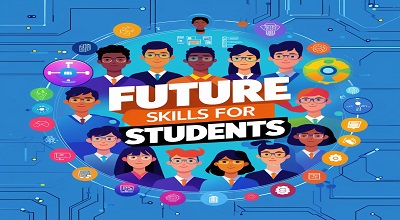Future Skills for Students
Future Skills for Students: students must equip themselves with skills that will remain relevant in the future job market. Technological advancements, globalization, and changing workplace dynamics demand a new set of competencies beyond traditional academic knowledge.
This article explores the latest future skills students need, along with practical examples and strategies to develop them. Whether you’re a student, educator, or parent, understanding these skills will help prepare for future success.
Why Future Skills Matter for Students?
The job market is transforming due to automation, artificial intelligence (AI), and digitalization. According to the World Economic Forum (WEF), technological changes will require 50% of all employees to reskill by 2025.
Future skills ensure:
✅ Employability in competitive job markets
✅ Adaptability to industry changes
✅ Entrepreneurial success for self-starters
✅ Personal growth and lifelong learning
Top Future Skills Students Need to Develop
1. Digital Literacy and Technological Proficiency
With AI, coding, and data analytics shaping industries, students must be tech-savvy.
Examples:
- Learning programming (Python, JavaScript)
- Using AI tools (ChatGPT, MidJourney)
- Data analysis with Excel, Tableau
2. Critical Thinking and Problem-Solving
Employers value individuals who can analyze situations and find solutions.
Examples:
- Case study analysis in business
- Debugging code in software development
- Strategic planning in marketing
3. Creativity and Innovation
Automation can’t replace human creativity.
Examples:
- Designing new products
- Writing original content
- Developing unique business strategies
4. Emotional Intelligence (EQ)
EQ helps in teamwork, leadership, and customer relations.
Examples:
- Resolving conflicts in a team
- Managing stress during exams
- Building strong professional relationships
5. Adaptability and Resilience
Industries change fast; students must be flexible.
Examples:
- Switching to remote work efficiently
- Learning new software quickly
- Handling project failures positively
6. Collaboration and Teamwork
Most jobs require working in teams.
Examples:
- Group projects in school
- Cross-departmental work in companies
- Open-source contributions in tech
7. Communication Skills
Clear communication is vital in all fields.
Examples:
- Writing professional emails
- Public speaking and presentations
- Negotiation in sales and business
8. Leadership and Management
Even non-managers need leadership traits.
Examples:
- Leading a student club
- Managing a freelance project
- Mentoring juniors
9. Financial Literacy
Understanding money management is crucial.
Examples:
- Budgeting personal expenses
- Investing in stocks or crypto
- Starting a small business
10. Sustainability and Environmental Awareness
Green jobs are rising in demand.
Examples:
- Learning about renewable energy
- Reducing waste in daily life
- Advocating for eco-friendly policies
How to Develop Future Skills?
1. Formal Education and Online Courses
- Enroll in Coursera, Udemy, or edX courses.
- Take certifications in Google Analytics, AWS, or PMP.
2. Internships and Real-World Experience
- Join startups, NGOs, or corporate internships.
- Work on freelance projects (Fiverr, Upwork).
3. Self-Learning and Continuous Improvement
- Read books, blogs, and research papers.
- Practice coding on LeetCode, HackerRank.
4. Mentorship and Networking
- Connect with industry professionals on LinkedIn.
- Attend webinars and workshops.
Examples of Future Skills in Different Careers
| Career Field | Key Future Skills Needed |
|---|---|
| Tech (AI, Data Science) | Coding, Machine Learning, Data Analysis |
| Healthcare | Telemedicine, AI Diagnostics, Patient Care |
| Business & Finance | Digital Marketing, Blockchain, Financial Modeling |
| Education | E-Learning Tools, Gamification, Adaptive Learning |
Challenges in Acquiring Future Skills
- Lack of access to quality education
- Fast-changing trends making skills obsolete quickly
- Financial constraints for advanced courses
The Role of Educators and Institutions
Schools and universities should:
- Integrate future skills into curricula
- Offer hands-on workshops
- Partner with industries for real-world training
Conclusion
Future skills are no longer optional—they are essential. Students who invest in digital literacy, critical thinking, emotional intelligence, and adaptability will thrive in tomorrow’s workforce. Continuous learning and practical experience will pave the way for success.
FAQs
Q1: What are the most important future skills for students?
A: Digital literacy, critical thinking, creativity, emotional intelligence, and adaptability are among the top skills.
Q2: How can students improve their future skills?
A: Through online courses, internships, self-learning, and networking.
Q3: Are soft skills like communication still important?
A: Yes, automation can’t replace human interaction, making soft skills crucial.
Q4: Which industries demand future skills the most?
A: Tech, healthcare, finance, and green energy sectors are leading.
Q5: Can future skills help in entrepreneurship?
A: Absolutely! Skills like financial literacy, leadership, and innovation are key for startups.
Free Here: Solo Leveling Arise APK
